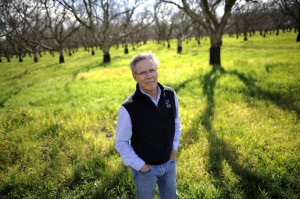By Craig McNamara, President, California State Board of Food and Agriculture
Tomorrow (May 5), the California State Board of Food and Agriculture will be hosting a drought forum at the Big Fresno Fair (10 am-1 pm) to to hear from California’s farmers, ranchers, farm workers, and other community stakeholders on the impacts of this drought – giving a voice to those who produce our truly remarkable food supply.
As we all know, the farming community is facing a very difficult time and the Board is very interested in learning more about the challenges Central Valley communities are experiencing. We understand all too well that farming is a major part of the Central Valley and an important piece of California’s heritage. How we manage this period of uncertainty and plan for a sustainable future will substantially shape the agricultural legacy here.
For some, this drought is seen as the end of California agriculture. Those holding that point of view may believe that farmers and ranchers consume more than their fair share of water. While it’s easy to cast blame, let’s not forget that irrigation wells have run dry, lifelong investments are dying in fields, and serious financial burdens are hanging overhead. These on-farm challenges seem to be absent from much of the discussion.
California agriculture is an amazing industry, in which a vast majority (74 percent) is small farmers with less than 100 acres. These are among the farmers who supply the more than 700 farmers markets throughout the state as well as local food that is enjoyed in restaurants and purchased at farm stands. Yes, we also grow tree nuts and are the leading producer of fresh fruits and vegetables in the nation and we should celebrate this success. We are diverse and successful because California agriculture continues to be innovative and adaptive.
As this drought progresses, all of us in agriculture need to do our part in conserving our precious groundwater resources and using water in the most efficient means available.
I look forward to the discussion tomorrow and in hearing perspectives from our farming community.



